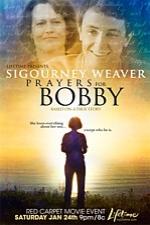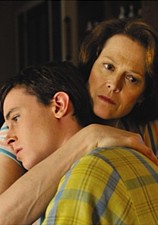
Knight at the Movies Archives
Sigourney Weaver elevates a timely TV movie
It’s true – many of the best roles for women of a “certain” age these days are to be found on television. Glenn Close has returned
as the powerful lawyer on Damages, the Wisteria Lane ladies are having a particularly good season on Desperate Housewives, and Toni
Collette soon takes on a three character starring role in United States of Tara, Showtime’s new series about a woman suffering from
multiple personalities. And Lifetime, the cable network famed for its “television for women” slogan has snagged Sigourney Weaver
to star in one of their made for TV movies. But Prayers for Bobby, premiering this week on the network and then repeating into
infinity, is anything but the standard female in crisis, mother and daughter dating the same man fare typical of the network. It’s
easy to see why Weaver signed on for the film – her role as the devout Christian mother of a troubled gay teen is richly complex and
Weaver is magnificent in the part.
I found the storyline for Prayers for Bobby eerily familiar. Based on true events the majority of the film takes place between 1979
and 1982 – the three year period in which high school teenager Bobby Griffith (Ryan Kelley) comes out to his family, finds himself
adrift from them (especially from Weaver as the mother and Henry Cznery as his tongue tied father) and then follows the sad set of
circumstances that will be familiar to a generation of gay men who came out during the period (yours truly included). Like many
parents in that more unenlightened era Mary and Bob can’t see beyond the prejudices of the middle class culture around them and
the religious bigotry espoused weekly from the pulpit at their conservative church.
Mary, especially, just doesn’t get it. “God will cure you,” she tells Bobby with perfect assurance while dad intones, “You’re not gay.
You probably haven’t met a girl you’re attracted to.” Mary takes him to a rigid shrink for “reparative therapy,” posts “helpful”
passages from the Bible throughout the house, prays over him (literally), has him exercise and gets him off junk food while dad
shares “manly” time with him (and at the same time puts down his desire to become a writer). Nothing changes Bobby’s nature,
however and soon the temptation of the local gay bar is too much. After some heavy petting ensues Bobby is even more
determined to be honest about who he is. But when two friends show up at the house dressed in character for a midnight screening
of The Rocky Horror Picture Show the mother reaches a breaking point. Gay is one thing but Dr. Frank-N-Furter and Magenta?! Never!
To clear the air Bobby takes a two month vacation to Portland where he stays with his understanding female cousin, who immediately
takes him to a gay bar and introduces him to David (played by soap opera hunk Scott Bailey), a hottie who becomes his boyfriend.
Returning home he announces he’s in love and again asks for acceptance but Mary is implacable telling him, “I won’t have a gay
son” and this time Bobby leaves home for good – with tragic results.
It’s at this point that the film – and Weaver’s performance – shifts into more complex territory. Faced with responsibility in the face
of tragedy Mary at last questions the rigidity of what she’s been taught and an encounter with Dan Butler (one of Hollywood’s first out
actors) as a reverend at a gay friendly church and Susan Ruttan as the mother of a gay son who points her toward PFLAG help with
Mary’s transformation.
Bobby Griffith’s coming out and subsequent ostracization from his family is sadly nothing new in life and on film (the recent Save Me,
the excellent queer indie, for example, also features a compelling portrait by Judith Light of a “compassionate Christian” forced to
reassess her views on the gay “lifestyle”) and Prayers for Bobby, directed by Russell Mulcahy (who helmed several episodes of Queer
As Folk) also has moments of an after school special quality to it (though it draws its tears fairly honestly).
But with Mary’s enlightenment from a conservative Christian to an all accepting one, which the last half of the film delves into, the
movie also touches on something larger that feels up to the moment; like something going on in the culture right now. Can it be
possible that centuries of acquiescing to religious terrorists by Our People will soon be a thing of the past? Is true tolerance really
upon us at last? Has the time for true Christianity in America finally returned?
“Did he really get all that from one pretty good TV movie made memorable by a great performance from its star?” you’re asking
yourself. Not altogether but when the network trumpeting the movie is Lifetime, a cable programmer which seems to know the exact
time to air a movie based on whatever Hot Topic is currently at the epicenter of the cultural zeitgeist (which we are, thanks to the
dastardly Prop 8 and a newly galvanized gay activism movement), the leap isn’t all that hard to make. Aside from that, didn’t we
also just begin a new era of inclusiveness on January 20th, just yesterday? So, forgive my optimism – at least for a day or two.
as the powerful lawyer on Damages, the Wisteria Lane ladies are having a particularly good season on Desperate Housewives, and Toni
Collette soon takes on a three character starring role in United States of Tara, Showtime’s new series about a woman suffering from
multiple personalities. And Lifetime, the cable network famed for its “television for women” slogan has snagged Sigourney Weaver
to star in one of their made for TV movies. But Prayers for Bobby, premiering this week on the network and then repeating into
infinity, is anything but the standard female in crisis, mother and daughter dating the same man fare typical of the network. It’s
easy to see why Weaver signed on for the film – her role as the devout Christian mother of a troubled gay teen is richly complex and
Weaver is magnificent in the part.
I found the storyline for Prayers for Bobby eerily familiar. Based on true events the majority of the film takes place between 1979
and 1982 – the three year period in which high school teenager Bobby Griffith (Ryan Kelley) comes out to his family, finds himself
adrift from them (especially from Weaver as the mother and Henry Cznery as his tongue tied father) and then follows the sad set of
circumstances that will be familiar to a generation of gay men who came out during the period (yours truly included). Like many
parents in that more unenlightened era Mary and Bob can’t see beyond the prejudices of the middle class culture around them and
the religious bigotry espoused weekly from the pulpit at their conservative church.
Mary, especially, just doesn’t get it. “God will cure you,” she tells Bobby with perfect assurance while dad intones, “You’re not gay.
You probably haven’t met a girl you’re attracted to.” Mary takes him to a rigid shrink for “reparative therapy,” posts “helpful”
passages from the Bible throughout the house, prays over him (literally), has him exercise and gets him off junk food while dad
shares “manly” time with him (and at the same time puts down his desire to become a writer). Nothing changes Bobby’s nature,
however and soon the temptation of the local gay bar is too much. After some heavy petting ensues Bobby is even more
determined to be honest about who he is. But when two friends show up at the house dressed in character for a midnight screening
of The Rocky Horror Picture Show the mother reaches a breaking point. Gay is one thing but Dr. Frank-N-Furter and Magenta?! Never!
To clear the air Bobby takes a two month vacation to Portland where he stays with his understanding female cousin, who immediately
takes him to a gay bar and introduces him to David (played by soap opera hunk Scott Bailey), a hottie who becomes his boyfriend.
Returning home he announces he’s in love and again asks for acceptance but Mary is implacable telling him, “I won’t have a gay
son” and this time Bobby leaves home for good – with tragic results.
It’s at this point that the film – and Weaver’s performance – shifts into more complex territory. Faced with responsibility in the face
of tragedy Mary at last questions the rigidity of what she’s been taught and an encounter with Dan Butler (one of Hollywood’s first out
actors) as a reverend at a gay friendly church and Susan Ruttan as the mother of a gay son who points her toward PFLAG help with
Mary’s transformation.
Bobby Griffith’s coming out and subsequent ostracization from his family is sadly nothing new in life and on film (the recent Save Me,
the excellent queer indie, for example, also features a compelling portrait by Judith Light of a “compassionate Christian” forced to
reassess her views on the gay “lifestyle”) and Prayers for Bobby, directed by Russell Mulcahy (who helmed several episodes of Queer
As Folk) also has moments of an after school special quality to it (though it draws its tears fairly honestly).
But with Mary’s enlightenment from a conservative Christian to an all accepting one, which the last half of the film delves into, the
movie also touches on something larger that feels up to the moment; like something going on in the culture right now. Can it be
possible that centuries of acquiescing to religious terrorists by Our People will soon be a thing of the past? Is true tolerance really
upon us at last? Has the time for true Christianity in America finally returned?
“Did he really get all that from one pretty good TV movie made memorable by a great performance from its star?” you’re asking
yourself. Not altogether but when the network trumpeting the movie is Lifetime, a cable programmer which seems to know the exact
time to air a movie based on whatever Hot Topic is currently at the epicenter of the cultural zeitgeist (which we are, thanks to the
dastardly Prop 8 and a newly galvanized gay activism movement), the leap isn’t all that hard to make. Aside from that, didn’t we
also just begin a new era of inclusiveness on January 20th, just yesterday? So, forgive my optimism – at least for a day or two.
Contrition:
Prayers For Bobby
1-21-09 Windy City Times KATM Column
By Richard Knight, Jr.
Prayers For Bobby
1-21-09 Windy City Times KATM Column
By Richard Knight, Jr.


